Top 6 Causes Of Stiff Joints After Sitting (+6 Solutions)
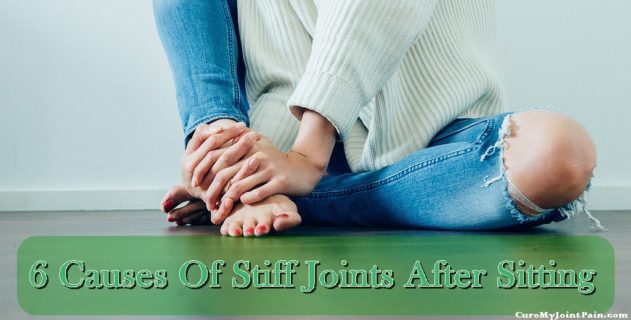
Each of us woke up with aching hands or legs at least once in our lives, didn’t we?
But when is that a reason to worry? Is it normal to have stiff joints in the middle of the day, after getting up from your desk? Not really, if you ask me. So if you’re dealing with this problem, you should try to find what’s behind.
Here are the top 6 causes of stiff joints after sitting – there are very high chances that you have one of these 6 problems. So that’s the best list to find the responsible.
Cause #1 – Osteoarthritis
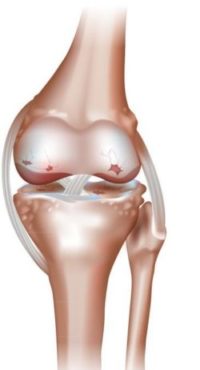 Common For: Elderly or people over 60
Common For: Elderly or people over 60
Have you ever heard your grandparents complaining of aching knees when they stand up? Have you ever noticed how slowly they get up? Well, the main responsible for both of these is osteoarthritis.
The Explanation: In OA, the bone cartilage gradually wears down, usually because of age. Fortunately, this doesn’t happen overnight. Sometimes it takes a few years for you to see the real signs of osteoarthritis.
But there are 2 consequence of this cartilage erosion:
- pain
- additionally, stiffness
In most cases, it’s all about the leg, knees and even toe joints. Just like morning stiffness tends to affect hand joints more, standing stiffness is mostly related to legs.
Best Sign To Recognize It: It usually has 2 major signs:
- It goes away within a few minutes after you stand up
- It affects the legs more than the upper part of your body
Best Remedy: Unfortunately, there isn’t much you can do to fight back this stiffness, especially after sitting down for a long time. Simply try not to stand up suddenly, and move slowly a few minutes after standing.
Glucosamine supplements are probably your best helper, but pay attention what brand you choose.
Cause #2 – Auto-immune Arthritis
 Common For: Mostly women, but there isn’t any rule – it can also affect men. Usually genetics play a big part in this kind of conditions. So if you have someone in your large family, you could be at risk.
Common For: Mostly women, but there isn’t any rule – it can also affect men. Usually genetics play a big part in this kind of conditions. So if you have someone in your large family, you could be at risk.
The Explanation: Stiffness is common in arthritis – especially if you have an auto-immune form. The joints are constantly swollen, so moving is very difficult.
But there are 2 things to point out:
- morning stiffness is very common in these conditions
- sitting stiffness also appears frequently
But I want to talk about the last one.
So if you get stiff joints after sitting down for a while, rheumatoid or psoriatic arthritis could be behind. In fact, they’re some of the top causes.
Best Sign To Recognize It: There are basically 2 things you can guide on:
- stiffness comes up even if you sit down for 10-15 minutes
- it needs a longer time to go away (over 10 minutes)
Best Remedy: If your arthritis is causing the stiffness, you have only one choice – to treat the cause. Otherwise, the stiffness won’t go away. It’s not the kind of symptom you can treat alone.
My #1 advice for auto-immune arthritis is turmeric, a natural herb that works amazing for inflammation. In fact, it’t the best natural anti-inflammatory. Turmeric supplements are the best form to use it, in my opinion. Here are the best ones for this year.
Cause #3 – Gout
Common For: Mostly men, it’s pretty rare in women. Just like in auto-immune arthritis, genetics is the main risk factor.
The pain from gout is probably the worst joint pain you can ever feel. I would describe it in 3 words:
- burning
- deep
- sudden
Now, imagine feeling this kind of pain and having your leg stuck at the same time. It doesn’t feel too good, does it?
The Explanation: The thing that causes gout are crystals of uric acid that are stored inside the joints. At one point, they cause terrible pain and stiffness. It’s like your toes are burning no matter in what position you’re holding them.
So there are basically 2 major things about gout:
- the pain is so terrible that you can’t ignore it
- usually, it appears during the night and you wake up in tremendous pain
- the stiffness doesn’t always appear
Therefore, if it’s just sitting stiffness bothering you, there are 99% chances that you’re not suffering of gout.
Best Sign To Recognize It: I would consider these 3 things:
- no morning stiffness (unlike other forms of arthritis)
- it only comes up during the attacks and disappears afterwards
- you will never have stiffness alone, without pain
Best Remedy: In this case, only a medical treatment is strong enough to treat the condition completely. I don’t recommend you any herbs or alternative remedies, because you need something that works fast.
Cause #4 – Pregnancy
 Surprisingly or not, that’s one of the less known causes of sitting stiffness. So why does this problem appear in pregnanacy?
Surprisingly or not, that’s one of the less known causes of sitting stiffness. So why does this problem appear in pregnanacy?
The Explanation: Well, there are 2 major reasons:
- extra weight
- hormones
Now let’s start with the first one. As your pregnancy advances, your baby also grows. Well, this increasing weight presses on your pelvis joints more with every day.
In fact, the #1 problem of pregnant women is SI joint pain. If you never heard of it, don’t worry. It basically affects the pelvis joints.
However, pregnancy can also produce joint stiffness – especially in the legs.
When you’re pregnant, your body prepares for birth by producing a hormone called relaxin. This hormone is meant to soften joints and muscles, in order to make them looser.
Best Way To Recognize It: It Usually appears in the last trimester. However, joint pain itself can appear in early stages of pregnancy, so if your’re also experiencing stiff joints, don’t panic. It’s probably normal.
Best Remedy: Time. In this case there isn’t much you can do other than taking an extra time for every activity, including getting up.
So if you sit down working at the computer or simply resting, don’t get up too sudden. You may feel like you’re losing control over your legs, but things will get back to normal after a few seconds.
Cause #5 – Lupus
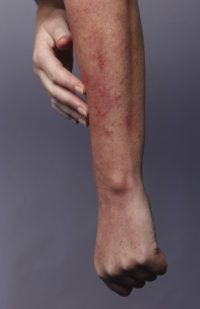 Common For: There’s no rule, but genetics and other risk factors are important.
Common For: There’s no rule, but genetics and other risk factors are important.
Lupus is another autoimmune condition that can produce joint pain on a daily basis. Joint inflammation is one of the regular symptoms of lupus. And where there’s inflammation, stiffness also comes up.
The Explanation: In lupus, your immune system attacks itself. For this reason, every part of your body will suffer at one point – joints included.
Just like in most types of arthritis, lupus patients experience stiffness especially in the morning, after laying in bed the whole night.
When a lupus patient sits down for hours, he feel like his legs are stuck and swollen after getting up.
Best Way To Recognize It: Other symptoms are a must:
- fatigue
- rash
- chronic joint pain
Stiffness never comes alone in lupus, so if you only experience this problem, you surely don’t have lupus.
Best Remedy: Medical treatment is a must because lupus affects immunity. So it requires a very serious treatment, it’s not something minor.
Cause #6 – Bursitis
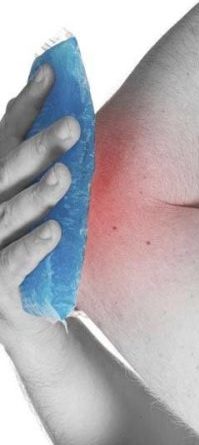 Common For: Usually adults over 40 or athletes that overuse their joints.
Common For: Usually adults over 40 or athletes that overuse their joints.
The Explanation: Bursitis is the inflammation of bursae, some small sacks located near the joints.
Though it’s pretty uncommon, bursitis is one of the common causes of joint inflammation – besides the arthritis family. This time, it’s the bursae that gets swollen, not the joints themselves.
This is a sac filled with lubricating fluid, located between tissues, that decreases rubbing, friction, and irritation. Obviously, where there’s inflammation, there’s also stiffness.
How To Recognize It: There’s not clear symptom for bursitis, but here’s how I differentiate it from arthritis:
- stiffness only appears in one of your arms
- not all your body is affected
- there’s also pain (it’s a must)
So if it’s only your arm feeling stiff, and you also experience some pain, it may be bursitis behind.
Best Remedy: Resting is probably the best thing you can do for bursitis.
Luckily, you don’t need to see a doctor because the inflammation will heal alone in a few days or weeks. Only try to minimize physical effort and you should be fine.
Best 6 Solutions You Have
By now, you should be able to identify what’s causing your stiff joints. So now what? Well, as you know what’s producing it, it’s time to find out what you can do about it. Here are the best 6 things you can do in this case:
#1 – Hot Bottles
Heat doesn’t always relieve arthritis pain – ice works better in this case. But when it comes to stiffness, heat is way better.
Make sure you have a hot bottle close and apply it on your stiff area, before you get up. You can also apply it after, but moving around will be a bit harder. You don’t need to use a bottle – if you have a heating pad, it’s a much better option.
Both of them would decrease your stiffness in a few minutes. So in my opinion, heat is the fastest solution – but keep in mind that it’s just temporary and you have to use it every time your joints feel stiff.
#2 – Glucosamine
This is more of a long term solution – it won’t work overnight, but it could do miracles after a while. I recommend it more if your stiffness is caused by osteoarthritis.
Glucosamine is the #1 substances for rebuilding cartilages – which is the problem that causes the stiffness from OA. You can find it mostly as supplements, so this could be a downside if you hate pills. But in my opinion, it’s a pretty comfortable solution.
A supplement with glucosamine sulfate, chondroitin and MSM is the perfect helper for osteoarthritis. But keep in mind that it’s a long term remedy, so don’t expect to see a change the next day.
#3 – Massage
That’s another solution that you can use immediately. It will only take a while and your stiffness will go away – but not for too long.
I recommend massage for people with chronic conditions – massage alone helps, but if you use some oils as well, the results are even better. Now you have 2 options:
- You can use regular oils like Coconut oil or Castor oil
- You can use oils that are specially designed for pain – CBD oil
No matter which category you choose, all you have to do is to massage the stiff area with both of your hands for a couple of minutes. Normally, your stiffness should go away pretty shortly.
#4 – Herbs
Herbal remedies are something I truly believe in – after all, I’ve experienced their power myself.
Well, herbs work best for inflammatory arthritis, like RA, PsA or gout. I would also recommend them for chronic pain, because they can help a lot.
Basically, my top recommendations are Turmeric and Boswellia. They are the best anti-inflammatory I know, and have very few side effects. If you’re interested in other herbs with this effect, here’s the full list.
Their biggest advantage – they work pretty fast, but act on the long term. So I totally recommend supplements with these herbs.
#5 – Exercising
Though I’m not a fan of it, exercising is a real solution for the long term.
Why I don’t like that much? Because it’s pretty hard to perform any physical activity when you have joint problems. I tried yoga and it wasn’t too easy at first – but it didn’t help a lot either.
However, regular exercising could help stiff joints. Movement increases flexibility, so you should see a minor improvement after a while. What kind of exercises should you do?
Don’t worry, I’m not talking about working out or running. Walking is perfect, especially for the beginning – only make sure to do it regularly, because that’s when it works best.
#6 – Special Routine
Now this is one interesting tip I can give you. It’s not a real solution, because it doesn’t always work – but it can help decrease your stiffness.
So what exactly is this special routine? Well, here it is:
- Don’t get up too sudden if you’ve been sitting for more than 20-30 minutes
- Before you get up, gently massage your legs or knees (or any part of your body that’s feeling stiff)
- If it’s your knees feeling stiff, try to rotate or bend them down (just a bit)
You can also do the last 2 points at ever 10-15 minutes, if you remember. It would help your joints stay fresh, so you could get up easier. Anyway, this routine doesn’t always help, but it’s extremely easy so I really recommend you to try it. You’re not losing anything, after all.
So What’s Causing Your Stiff Joints?
If you’re suffering from a form of arthritis, it’s surely this condition producing your pain.
Whether it is osteoarthritis, rheumatoid or psoriatic arthritis, stiffness is one of its regular symptoms. So if you were diagnosed with one of these, don’t dig too deep – it’s surely the arthritis behind.
However, in case you’re not an arthritis patient, your stiffness may be caused by another health issue – lupus, bursitis or even gout.
It’s all about finding out what’s causing your stiffness. Once you know the diagnosis, you can get rid of that stiffness with the proper treatment.
The 6 solutions from above will surely help – at least some of them, according to the cause of your pain. So you can try them out and see if they help. But normally, they really should.
In case you need any other advice, leave a comment below and I will gladly get back to you shortly.



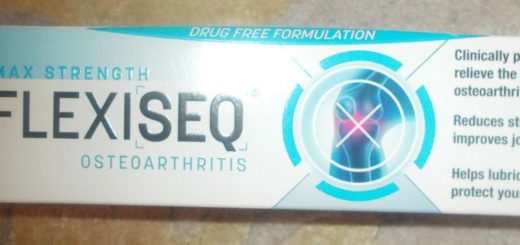

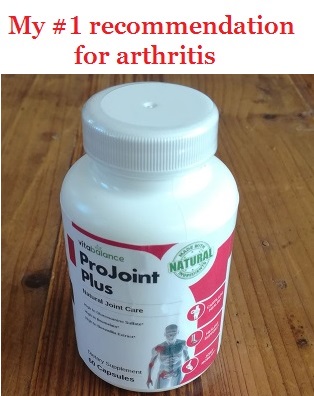
My grandpa do complain of aching knees whenever he wakes up. Reading this has really educate me on the cause. It has also happened to me recently, when I woke up my legs where really aching me. But maybe it was just a bad sleeping posture, because the next day they were fine. Thanks for giving out so many solutions because now I know how to get rid of joint stiffness, I will keep a hot bottle close and use it whenever I need again.
Hey Jack, thanks for reading my article.
Yeah, heat is one of the best remedies for stiffness and I say that from experience. It just decreases the stiffness really fast – so if it normally lasts for 40 minutes, if you apply heat it can go away in 20. That’s a great hack I always use.
Your grandpa probably has some problems with his knee joints – they usually appear to everyone once he/she gets older. I have 2 recommendations for him:
– If the pain isn’t very high, he could try Cayenne pepper patches or ointments. They only decrease the pain for a short while, but if he has no serious problems, that’s all he needs.
– If his pain isn’t something new, he probably has a mild for of arthritis. In this case, a natural supplement could reduce the symptoms and keep the problem under control (so that it doesn’t worsen). These are the best knee products that I tried – so I think you should take a quick look.
And regarding your stiffness, I agree – it was probably just temporary. You didn’t mention your age, but I assume you’re not very old, so it might have been just a bad sleeping position.
If you have any other questions, you can ask me anytime.
I’ve never had real serious joint pain but I have had minor joint stiffness especially after playing badminton or too much computer games. The tips you mention at the bottom work very well. Massages and heat packs are my common go to but more recently, I tried out acupuncture. It’s quite great and another solution to joint pains.
Hi Kevin, thanks for sharing your thoughts.
Your stiffness is probably caused by that effort, so nothing major to worry about.
I’m not a big fan of acupuncture, but that’s mostly because of hygienic fears. Some people complain that certain practitioners don’t sterilize the needles regularly, so there’s a risk of getting some real heal problems. But I can’t tell, every time I tried acupuncture they were very hygienic. But either way, it didn’t help tremendously.
Thanks for reading my article.
I usually have this stiff joints when sitting for a long time or even lying down on my bed throughout the night , it hurts me so bad that i could barely stand up so what i do is immediately start taking walks until the pain calms down and then i go about with my usual activities. What treatment do you recommend for me, by the way i’m young so i don’t have any arthritis.
Hi Seun, from what you tell me you don’t have any kind of joint problems. So you don’t have regular pain, only stiffness – and only after sitting or laying down.
Well in this case, I don’t advise you to take any supplement. Your joints aren’t swollen and your cartilages are probably healthy – otherwise, you would be in constant pain (not just after laying down).
So I wouldn’t recommend you any real treatment, because you don’t have a major problem. But here’s what I think you should try:
1. First, make an appointment to your doctor and ask for some blood test – especially the level of magnesium. A small deficiency in this substance can cause serious pain (muscle not joint pain – but it’s hard to tell the difference).
If it turns out you have a lack of magnesium, your doctor will probably prescribe you a supplement. One thing you can use is this Theraworx Relief foam – which works within seconds, but only for people with this deficiency.
If there’s something else causing your pain, it’s not going to work at all.
2. You can keep a hot bottle or a heating pad close to your bed. So when you wake up, simply hold it on your painful spot and the stiffness should decrease. Heat reduces stiffness, so you should be able to walk without so much pain.
That’s the best advice I can give you, because I can’t really tell what’s the real cause behind your problem.
Hope this helps.
I have stiff knees many times and I don’t have arthritis. I don’t think it’s one of these causes but I will the solutions you offered, maybe they help. Thanks
Hey Joanna, it might be just something temporary. You didn’t mention your age or any other details (if you had an accident, when did the stiffness start, how long it lasts, etc.) but I assume you don’t have any other problems like pain or inflammation.
So yeah, I think the best thing you can do right now is to try one or several of these solutions and see if they help. You could start with heat, exercises or massage. I wouldn’t recommend taking any supplement yet – because you probably don’t need it.
Try the alternative remedies from this article and see how it goes. If you don’t feel better, let me know and I will try to give you some additional advice.
Hello Heather. My uncle has a problem with joints and he doesn’t know what he can use to avoid pain. I don’t know much detail but sometimes he can hardly move his legs because of stiffness and pain. Oh and they’re also red when he has that terrible pain. I know he doesn’t have arthritis, but maybe gout?
I see that you recommend some herbs, I like everything natural and I will surely buy him turmeric and I hope that it will help him.
Hi Jacob. It could definitely be gout. Do you have someone in your family with this condition – grandparents, older relatives? Gout can sometimes be inherited, so if someone from your family had this diagnosis – your uncle could also be at risk.
Now, let me ask you a few questions (you can ask him if you don’t know the answer):
1. Does this pain and stiffness come up frequently – or just several times per month/year?
2. Is the pain hard to bear or it’s not very high, just annoying?
3. Is it located in the same place or he has pain in several parts of his body?
That would help me get a better idea about whether he has gout or not.
But either way, if the pain is really bad – I really advise him to see a doctor. If he has gout, natural remedies aren’t going to solve it alone – using a classic treatment is a must.
Now, he could also use turmeric, since it really helps inflammation (and his pain seems to be caused by inflammation). Here’s a list of the best turmeric products I tried, in case you need some more alternatives.
If you can, get back to me with more details and I will see what advice I can give to your uncle. Hope this helps.
Hello, Heather and thanks for this interesting article. I don’t have any issues with joint pain well, at least not in the sense you speak of. I have an ongoing back issue, (related to disks) but as long as I behave myself and don’t push it at work, even that is mostly a non-issue and manageable. I consider myself blessed/lucky to be in as good health as I am considering I am going to be 70 this year.
My wife, on the other hand, is experiencing some issues with the very beginning stages of arthritis and some stiff joints and muscles. You see, when she was 18 she was struck by a car, (not hard but enough to knock her down) and banged up one of her knees and I think there may be a hip issue as a result of the accident.
She is 63 now and is experiencing some of the effects from that accident and I was wondering if something like what you recommend here might be useful to her?
Retirement is in our near future and our intention is to get more active when that happens, however, at the moment she has a sit-down job and even though we walk every day, the fact that she sits for so long seems to aggravate the stiffness in her knee and hip.
Do you think your #1 recommendation, (I read a little of your review on it), would help?
Wayne
Hi Wayne, thanks for your question.
Considering your wife’s age, I assume she has a beginning form of osteoarthritis – which usually develops with age. Also, you didn’t mention she’s in pain, so her form is probably very easy.
But there’s one thing you should know: osteoarthritis affects cartilages in time. So they start to damage slowly with each year. That’s why many elderly have joint pain and cartilage problems.
So I do recommend your wife to start taking some glucosamine sulfate + chondroitin. Her arthritis is just at the beginning, so for now she’s not in big pain – but this condition will surely progress. ‘
So if she starts with glucosamine from now, they will prevent her cartilages from damage in the future – which is essential.
Her accident probably had something to do with her cartilages. But as she was younger, she didn’t feel the effect. Now that her cartilages are normally getting weaker (due to aging), the effects of that accident are starting to come up.
So the product I recommend is ProJoint Plus, the one you mentioned. It’s the best choice for OA (both for treatment and prevention) because it contains the strongest form of glucosamine and it’s also cheaper than others overall.
Another thing she can try is heat – heating pads or a hot bottle. Whenever she feels very stiff, she should just apply that heat onto her joints and the stiffness should go away much faster.
Also, diet can really help, especially foods that contain antioxidants. They fight free radicals – which produce aging and joint damage. So common foods like celery, citrus or cherries can add up their benefits.
When you both retire, you probably plan to travel more and get more active, as you said. So physical activity should also help her, even a bit.
That’s mostly the advice I would give her. As she has an early form, she could also try to follow some of these 8 steps for OA. In her case, they would be a lot more effective than for someone with a severe form. So it would help keeping the condition under control.
Thanks for the advise, Heather. We will definitely be looking into this.
I think one cause of “stiffness” that is not being completely identified is pain / stiffness from inactivity, too much sitting and lying down! When a person sits or reclines most of the time their tendons are not stretched enough to remain elastic! Examples are: when the body is in a fetal position like sitting and laying. The tendons foreshortened and are less flexible and elastic thus causing pain in the groin area and legs when stretched into a standing position! The achilles heel foreshortens and makes safe standing and walking difficult! All the tendons in the body become less flexible and make movement painful from inactivity. This isn’t caused from lack of exercise it is from lack of movement. Inactivity causing foreshortened tendons also cause atrophy of the muscles. People need to be educated on how to help bed ridden and chair ridden people move because immovable people will only get worse.
Hi Patricia, I totally agree. That’s why you’re always told to try to move after any surgery, for example.
The only problem is that when you’re in pain – moving around or any small activity becomes so hard. If your joints already have problems, they will get ever stiffer if you sit down for a long while. So I don’t really know if it’s the lack of movement behind. I totally understand your idea – and for a healthy person, I completely agree.
But when it comes to people with joint problems, I’m not so sure. I mean – what you said is probably true. The thing is that the lack of movement is just a consequence of the pain – not something you do on purpose.
I’m not sure if you got what I was trying to say. But either way, thanks a lot for letting me know your opinion.
I have grand mother who is complaining each day about her joints we have been taking her to the hospital regularly. Do we have supplements that can drastically reduce the pain? The medication she received from the doctors makes her stomach hurt. will she have to put with the stiffness and pain for the rest of her days? is there anything we can do to help her?
Hello Adhmed. Since she’s a grandmother, I assume she is probably older (over 70) so she probably has osteoarthritis. That’s what makes her joints painful and very stiff, especially after sitting down for hours.
I don’t know what exact medication her doctors prescribed, but it could be NSAIDs. They usually cause stomach problems, so that could be where the pain comes from.
Now – in osteoarthritis, NSAIDs aren’t very useful because there’s just some minor inflammation. The cause behind OA is cartilage damage. There is some inflammation too, but it’s not something massive.
I do agree that NSAIDs can help that minor inflammation, but something less powerful would do too. If she reacts so badly to those drugs, maybe she should stop taking them – but ask her doctors first, because they can give the best advice.
Getting back to your question – what could help her best are glucosamine supplements:
– they rebuild damaged cartilages
– protect the joints from further damage
– basically they treat the cause behind the pain
So that’s why a glucosamine product could help your grandmother with her pain – by treating the cause behind.
Obviously, they’re not going to work overnight, but she should see some changes within a few weeks.
There’s one supplement that I really recommend in my articles – because it’s really effective, contains great stuff and it’s cheaper than most.
It’s called ProJoint Plus and I’ve had great results with it – you can find them here. That’s why I think it would really help your grandma.
But I want to give you some more options to choose from – so you should check out this list about the best products for OA. Some of those supplements are more expensive, but you can find cheaper ones as well.
So for now, I think glucosamine supplements are the best thing she can have. They will surely help.
Let me know how she feels after a few weeks.
rolled my ankle 4 years ago and never really took good care of it. Now everyday after work i have pain and stiffness that eventually fades
Hi Caleb. Before I recommend you anything, I suggest you to visit a specialist. If the pain and stiffness are still present, it’s clear that the problem is still there, but it has only gotten better with time. Since you were completely fine before rolling your ankle, this is surely the cause – but as it wasn’t properly treated, it’s still persisting. So instead of trying turmeric or other products I usually recommend for cases similar to yours, I strongly recommend you to visit a doctor.
I hope this advice helps you any single bit.
I’m 60 years old…Diabetes 2 since my 50s, fibromyalgia, some osteoarthritis, sciatica, and severe stiffness (I walk with a cane now). What I’m experiencing is increasing stiffness that lasts the entire day. I feel like the Tin Man only I haven’t been able to find the oil can to lubricate the joints. Any suggestions?
Hi Gloria. I’m guessing you need something that works instantly and probably on the short-term (fast relief solutions don’t usually last). Have you tried any numbing creams (like Penentrex)? They only provide a relief that lasts a couple of hours, but they surely help in this period. You will have to reapply the product several times a day, but I don’t think this would bother you too much as long as you experienced some relief.
Also, have you tried using heating pads? They are very helpful against stiffness (a hot bottle or rice bag would do the trick as well).
Obviously, walking will help on the long term, but it will not take your stiffness away from the first. It’s more of a long-term improvement. Hope this helps!
I would also add food allergy as a possible cause – I get stiff after eating pizza, it seems likely due to high levels of gluten, nightshades (tomatoes) and/or dairy…
Hi Lisa, that’s totally possible, thanks for the tip!